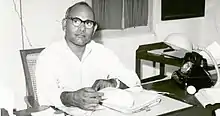Masood Khadarpoosh
Masud Khaddarposh (1916-1985) was a bureaucrat,[1] Pakistan movement activist, agricultural reformist and a champion of the Punjabi language. He was born on June 25, 1916, in the Gumti Bazaar area of Lahore. He died on December 25, 1985, in the city of his birth. Justice Anwaar ul Haq is reported to have said that in 1939 only nine out of 600 candidates qualified for the ICS exam out of which five were Muslims, including himself, Saeed Jafri, Muhammad Masud, Ikram Ahmad Khan and KS Islam. Masud joined the Indian Civil Service in 1941 and retired in 1972 in Pakistan.[2] He is still remembered as one of the pioneers of agricultural reforms in Pakistan. He was a role model for young civil servants due to his uprightness and selfless service. He was appointed in Sindh.[3][4] He always wore Khaddar, a traditionally made simple cotton cloth. That's why Fatima Jinnah gave him the title Khadsarposh, which means a person who wears khaddar.[5]

Pakistan Movement
Masud Khadarposh harboured deep rooted hatred for Hindus and Sikhs and he never tried to hide it. To the misfortune of native Sikhs and Hindus Masood was Deputy Commissioner of Nawabshah district at the time of partition of India. He used his position and administrative resources to terrorise Hindus and Sikhs in order to force them to leave their homes and migrate to India. Masud has been blamed to have orchestrated attacks on Sikhs and Hindus in Nawabshah forcing them to abandon everything and flee to India. The most atrocious incident took place in January 1948 when a train full of mostly Sindhi Sikhs trying to flee to Jodhpur India was attacked at Shafiabad just after leaving Nawabshah railway station. The attack was allegedly planned by Masood in which hundreds of Sikhs were butchered and women abducted. All those bodies were dumped in a well in Nawabshah, and young girls were forced to convert and mary locals. Masood got away with such crimes against humanity and he never showed remorse for the carnage of innocent Sikhs and Hindus in Nawabshah. The carnage was almost forgotten but recently the renowaned PakistanI historian Dr Ishtiaq Ahmed mentioned it in his lecture discussions. Masood also encouraged and facilitated refugees from East Punjab to settle in Nawabshah who were given the properties belonging to Sikhs and Hindus. This distorted demographic balance of Nawabshah district. While in his native Punjab Masood is still held in esteem but to the locals in Nawabshah Sindh he is seen as a villain and a butcher. Masud was transferred to Nawabshah as Deputy Commissioner in 1946. [6] He accompanied Mohammad Ali Jinnah to Quetta and played some role in persuading the tribal chiefs of Baluchistan to join Pakistan. In the partition, he continued in the same post in Nawabshah district of Sindh.[7] Later, he served as deputy commissioner in Muzaffargarh and in the Board of Revenue, Punjab government, Pakistan.
Sindh Hari Committee Report
Before 1947, the Sindh government formed a committee, with Sir Roger Thomas as its chairman.[8] Other members included Noordeen Siddique and Masood Khadarposh. Agha Shahi was the secretary of committee. Because Masood Khadarpoosh considered the report to be misleading and did not agree with the contents, he wrote a dissenting note. Due to his note and public pressure, the Pakistan government instituted land reforms.[9]
See also
References
- "PAKISTAN: Masud Khaddarposh - human rights activist". Retrieved 2021-09-01.
- رضی, رضی الدین. "مسعود کھدر پوش: ہاریوں کی زندگی بہتر بنانے کا خواہشمند 'پاگل ڈپٹی کمشنر' (وفات پچیس دسمبر 1985 ء". Retrieved 2021-09-01.
- "Indus Water Basin Treaty". DAWN.COM. 2008-11-22. Retrieved 2021-01-03.
- "Remembering Masud Bhagwan — Masud Hari — Masud Khaddarposh". Daily Times. 2020-08-09. Retrieved 2021-01-03.
- رضی, رضی الدین. "مسعود کھدر پوش: ہاریوں کی زندگی بہتر بنانے کا خواہشمند 'پاگل ڈپٹی کمشنر' (وفات پچیس دسمبر 1985 ء". Retrieved 2021-09-06.
- رضی, رضی الدین. "مسعود کھدر پوش: ہاریوں کی زندگی بہتر بنانے کا خواہشمند 'پاگل ڈپٹی کمشنر' ( وفات پچیس دسمبر 1985 ء". Retrieved 2021-09-01.
- "Information regarding Masood khaddarposh ex chief secretary of Pakistan?". Answers. Retrieved 2021-01-03.
- "THOMAS, Sir Roger Thomas (1886-1960), a pioneer of modern agriculture in India; | Dictionary of Welsh Biography". biography.wales. Retrieved 2021-01-03.
- رضی, رضی الدین. "مسعود کھدر پوش: ہاریوں کی زندگی بہتر بنانے کا خواہشمند 'پاگل ڈپٹی کمشنر' ( وفات پچیس دسمبر 1985 ء". Retrieved 2021-09-01.